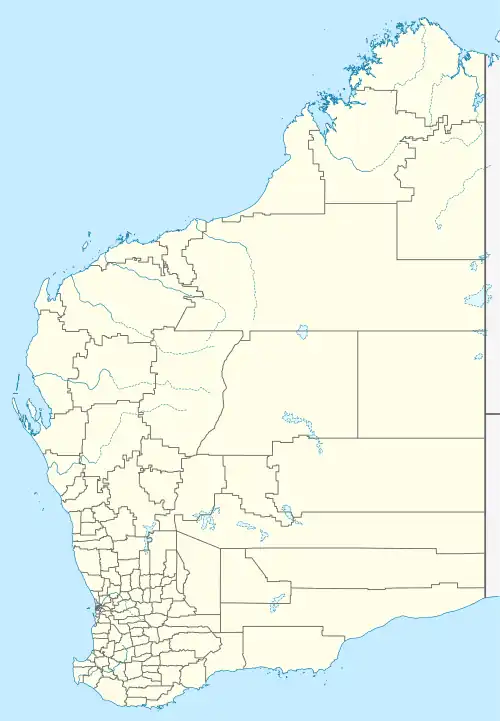| Locke Nature Reserve Western Australia | |
|---|---|
 Locke Nature Reserve | |
| Nearest town or city | Busselton |
| Coordinates | 33°40′S 115°14′E / 33.66°S 115.24°E |
| Established | 1992 |
| Area | 222 hectares (550 acres)[1][2] |
| See also | List of protected areas of Western Australia |
The Locke Nature Reserve, also known as the Locke Estate, is an area of Crown land located on the coast of Geographe Bay near Caves Road approximately 10 kilometres (6 mi) west of the town of Busselton. Comprising an area of 37.5 hectares (93 acres), the estate was designated an A-Class Reserve in the 1920s for the purposes of "Recreational Campsites and Group Holiday accommodation".
The estate was divided into 16 sites which have been leased to churches and community organisations at minimal rates.[3] The presence of the church sites throughout the estate has led to the area being known locally as the "Holy Mile".[4][5][6]
The Locke Estate provides low-cost accommodation along one of the most expensive real estate locations in the South West region of Western Australia. As an A-Class Reserve the land cannot be sold and has the highest level of protection.[7]
The estate was gazetted as a nature reserve with a size of 222 hectares (550 acres) on 11 February 1992.[1]
In 2018, a bridge was built from the reserve across the Buayanyup River to link two previously isolated populations of western ringtail possums.[8][9][10]
References
- 1 2 "Terrestrial CAPAD 2022 WA summary". www.dcceew.gov.au/. Department of Climate Change, Energy, the Environment and Water. Retrieved 9 September 2023.
- ↑ "Australian Protected Areas Dashboard". www.dcceew.gov.au/. Department of Climate Change, Energy, the Environment and Water. Retrieved 9 September 2023.
- ↑ "Locke Estate". City of Busselton. Retrieved 10 August 2019.
- ↑ "Interest in Busselton's 'Holy Mile' sites". Busselton Mail. 12 March 2012. Retrieved 10 August 2019.
- ↑ "Battle on the Holy Mile", Australasian Business Intelligence, COMTEX News Network, Inc: 1008049i6424, 18 February 2002, ISSN 1320-6680
- ↑ "Developers eye SW's Holy Mile coastal strip", Australasian Business Intelligence, COMTEX News Network, Inc, 15 February 2007, ISSN 1320-6680
- ↑ Western Australia. Department for Planning and Infrastructure; Western Australia. Dept. for Planning and Infrastructure. New Coastal Assets Branch (2004), Locke Estate Busselton (Class 'A' Reserve no. 22674) : investigation of beach stabilisation, Dept. for Planning and Infrastructure, retrieved 10 August 2019
- ↑ Ison, Sarah (23 July 2019). "Hopes new bridge will link possums". Busselton Dunsborough Times. Retrieved 10 August 2019.
- ↑ BA Jones; RA How; DJ Kitchener (1 March 1994), "A field study of Pseudocheirus occidentalis (Marsupialia : Petauridae) II. Population studies", Wildlife Research, CSIRO PUBLISHING, 21 (2): 189–201, ISSN 1448-5494
- ↑ Jones, B.A; Meathrel, C.E; Calver, M.C (2004), Hypotheses arising from a population recovery of the Western Ringtail Possum Pseudocheirus occidentalis in fire regrowth patches in a stand of Agonis flexuosa trees in south-western Australia, Royal Zoological Society of New South Wales, retrieved 10 August 2019